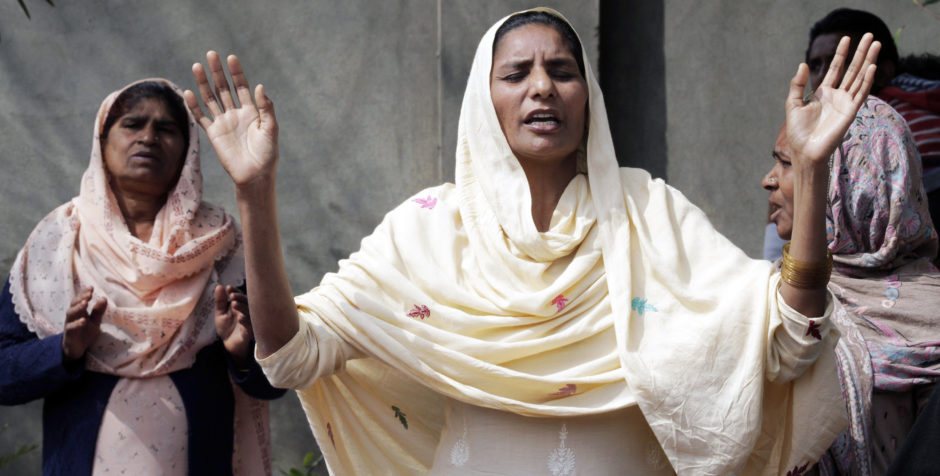Defending Pakistani Christians at the United Nations
Persecution of Christians is increasing world-wide. Today, our affiliate – the European Centre for Law & Justice (ECLJ) – gave an oral intervention before the United Nations’ Human Rights Council on behalf of persecuted Christians in Pakistan:
Today the ECLJ would like to draw this Council’s attention to The Islamic Republic of Pakistan, a Muslim majority country, which is one of the worst violators of human rights. Mob violence, false accusations of blasphemy, forced conversions to Islam, police torture, and other forms of persecution and discrimination are a commonplace. Despite growing extremism, the Pakistani government has failed to protect its minorities from religiously-motivated violence or bring perpetrators to justice.
An example of the Pakistani government’s attitude toward religious minorities can be seen in its handling of the 2013 mob attack on the Christian neighborhood called Joseph Colony. A mob of Muslims burned and vandalized about 200 Christian homes after an allegation of blasphemy against one Christian was made. While the Muslim attackers were let go scot free, the Christian man originally accused of blasphemy was sentenced to death.
About 40 people are currently on death row or serving life sentences under Pakistan’s blasphemy laws that, inter alia, provide the mandatory death penalty for defaming the Prophet Muhammad’s name. Asia Bibi, a Christian mother of five, has been in prison for almost eight years. In 2009, Asia was accused of blaspheming the Prophet Muhammad’s name. A trial court sentenced her to death in 2010. An intermediate appellate court, upheld her conviction after four years. Asia is waiting for the Supreme Court to hear her appeal.
The ECLJ urges the U.N. to remind Pakistan that it is required to protect its religious minorities and protect their fundamental rights. Pakistan must bring the perpetrators of violence to justice and provide a safe environment to its religious minorities.
Our oral intervention was only able to detail a few of the numerous religious violations occurring in Pakistan. For example, in 2014, a Muslim mob burned a Christian couple to death after an allegation that the couple had burned pages of the Quran. In this case, however, the court convicted thirteen individuals for the vicious death of this Christian couple.
In addition to these deadly outcomes, Christians and other minorities are also daily persecuted and humiliated in a number of other ways. In one year alone (from July 2013 to June 2014), there were over a hundred incidents of sectarian violence against Shia Muslims, Christians, Hindus, and Ahmadis. These incidents resulted in more than 1,200 casualties.
More specific examples include the case of Jurra Masih, a Christian man, who was beaten, shot in the hand, and had his property set on fire by Muslims after a profit dispute regarding a business partnership. Or think of Bashiran Bibi, an elderly Christian woman, who was brutally assaulted by an influential Muslim man for refusing to clean his house. Or consider Nadeem Masih, a Christian worker at a brick kiln, who had his eyebrows, head, and beard forcibly shaved under orders from his Muslim boss after he merely asked his boss for his agreed-upon wages and refused to work until he was justly compensated.
In another blasphemy case, Nabeel Masih, a young Christian, was imprisoned after “liking” a supposedly “sacrilegious” picture on Facebook. His family was forced to leave the area for fear of reprisal. Just this week, a Shiite Muslim man was sentenced to death for allegedly posting blasphemous content on Facebook.
The list of despicable injustices goes on and on. And these incidents are not out of date. Such things happen each and every day. Earlier this month, a Christian sanitation worker died after being refused care by Muslim doctors who declined to touch his “unclean” body during Ramadan. After being exposed to noxious fumes, Irfan Masih passed out. His coworkers rushed him to the hospital only for Irfan to die of asphyxia after Muslim doctors protested touching Irfan because it would ruin their fasts.
Because of incidents like these, religious minorities in Pakistan view their government as unwilling to bring an end to the violent attacks and other forms of persecution they so frequently suffer. This is why we are urging the United Nations to remind Pakistan of its obligations to protect all its citizens and their fundamental rights. Christians, such as Asia Bibi, need our voice to speak for them. Join with us as we defend these Christians. Sign our petition today (below and) at BeHeardProject.com.
